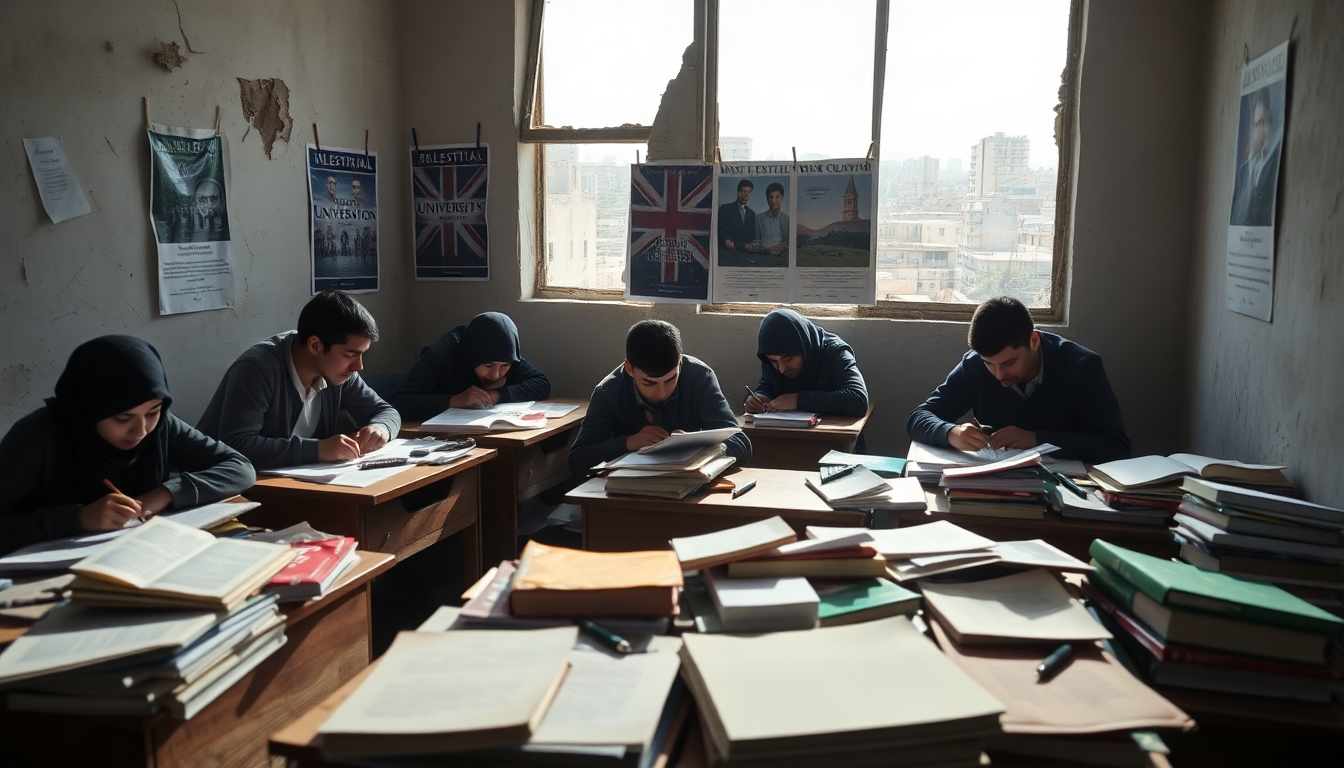Table of Contents
The journey toward higher education is often filled with hope and ambition. But for many Palestinian students in Gaza, this path is anything but straightforward. With dreams of attending prestigious UK universities, these students have received acceptance letters but are trapped in a landscape marred by conflict and political indifference.
This article sheds light on their harrowing experiences, showcasing their determination to succeed despite overwhelming odds and examining the contrasting responses from different nations to their plight.
Trapped in Gaza: A Tale of Ambition and Despair
As conflict in Gaza intensifies, the dreams of countless students hang precariously in the balance.
Among them are individuals who, after enduring bombings and displacements, have finally received acceptance from esteemed institutions like Glasgow, Edinburgh, and Birmingham. After pouring hours into applications, tests, and securing funding, their aspirations feel tantalizingly close. Yet, instead of gearing up for their new academic lives, they find themselves confined within the war-torn borders of Gaza.
The reality is jarring: while countries like France and Ireland have proactively arranged evacuation plans for their students, the UK has largely remained silent. Why is there such a lack of action? This raises crucial questions about how much value is placed on the futures of these young scholars.
With their dreams deferred, they are left to navigate a sea of uncertainty, compounded by the absence of a visa processing center in Gaza, which keeps them in a frustrating limbo.
But it’s not just about individual aspirations; this struggle reflects a broader desire for education and progress within a community that has faced relentless challenges.
With scarce resources, these students have shown remarkable ingenuity in tackling the complexities of the application process, often studying in perilous conditions with limited access to technology or support. The pursuit of education is not merely a personal quest; it’s a collective aspiration shared among families in Gaza.
Roadblocks at Every Turn
Despite their commendable accomplishments, the hurdles faced by these students seem almost insurmountable. Following the outbreak of conflict in late 2023, many had to pause their online studies due to the untenable conditions in Gaza. Yet, their commitment to education remains unwavering. They’ve engaged tirelessly with the UCAS application process, crafting personal statements and gathering documentation, often relying on borrowed internet connections in makeshift environments. Their tenacity is inspiring, but it starkly highlights the grim realities they confront.
Receiving offers from UK universities should have been the next step in a straightforward journey—applying for visas. However, the bureaucratic labyrinth revealed yet another roadblock: the need for biometric fingerprinting, a service unavailable in Gaza. This requirement effectively halts their progress, as students would need to cross borders currently closed to them unless they are part of an official evacuation. This bureaucratic deadlock is a source of profound frustration for those who have already overcome so many obstacles to reach this point.
While some countries have stepped up to protect their students’ futures through coordinated evacuation efforts, the UK government’s silence is disheartening. Advocacy groups, universities, and even some members of parliament have raised their voices in concern, yet the lack of response suggests a troubling disregard for the plight of these students. What does this say about the priorities of governments in times of crisis?
The Call for Action and Hope for the Future
As the academic year in the UK approaches, the urgency of the situation becomes increasingly evident. Many students are running out of time, with their places at universities hanging by a thread. Organizations like the Gaza Scholarship Initiative (GSI) are tirelessly working to raise awareness and advocate for immediate action. They firmly believe that education is a fundamental right that should not be denied due to geopolitical circumstances.
This moment is crucial. The UK has long been seen as a champion of education and international cooperation, and failing to extend that support to Palestinian students sends a troubling message. Isn’t it imperative for the UK government to step up and facilitate these students’ access to education, mirroring the actions of other nations that prioritize their citizens’ futures?
Ultimately, the plight of these students serves as a powerful call to action. If the UK aims to remain a beacon of hope and opportunity, it must acknowledge its responsibility to those who have fought valiantly to secure their place in its educational institutions. Their dreams should not be extinguished by political indifference; rather, they should be embraced as part of a global commitment to education and human rights.





